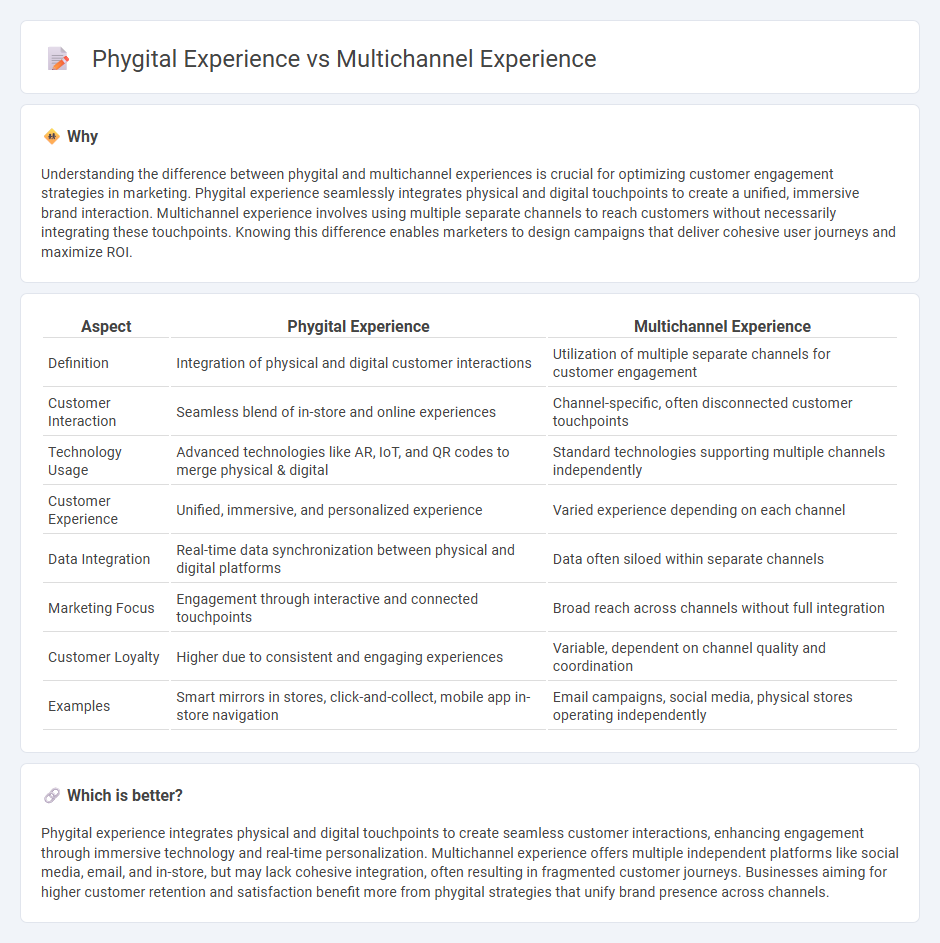
Phygital experience blends physical and digital customer interactions to create seamless, immersive marketing journeys, enhancing engagement and brand loyalty through synchronized touchpoints. Multichannel experience involves multiple separate channels like social media, email, and retail stores, offering diverse customer access but often lacking integration between platforms. Explore how combining these strategies can revolutionize your marketing effectiveness.
Why it is important
Understanding the difference between phygital and multichannel experiences is crucial for optimizing customer engagement strategies in marketing. Phygital experience seamlessly integrates physical and digital touchpoints to create a unified, immersive brand interaction. Multichannel experience involves using multiple separate channels to reach customers without necessarily integrating these touchpoints. Knowing this difference enables marketers to design campaigns that deliver cohesive user journeys and maximize ROI.
Comparison Table
| Aspect | Phygital Experience | Multichannel Experience |
|---|---|---|
| Definition | Integration of physical and digital customer interactions | Utilization of multiple separate channels for customer engagement |
| Customer Interaction | Seamless blend of in-store and online experiences | Channel-specific, often disconnected customer touchpoints |
| Technology Usage | Advanced technologies like AR, IoT, and QR codes to merge physical & digital | Standard technologies supporting multiple channels independently |
| Customer Experience | Unified, immersive, and personalized experience | Varied experience depending on each channel |
| Data Integration | Real-time data synchronization between physical and digital platforms | Data often siloed within separate channels |
| Marketing Focus | Engagement through interactive and connected touchpoints | Broad reach across channels without full integration |
| Customer Loyalty | Higher due to consistent and engaging experiences | Variable, dependent on channel quality and coordination |
| Examples | Smart mirrors in stores, click-and-collect, mobile app in-store navigation | Email campaigns, social media, physical stores operating independently |
Which is better?
Phygital experience integrates physical and digital touchpoints to create seamless customer interactions, enhancing engagement through immersive technology and real-time personalization. Multichannel experience offers multiple independent platforms like social media, email, and in-store, but may lack cohesive integration, often resulting in fragmented customer journeys. Businesses aiming for higher customer retention and satisfaction benefit more from phygital strategies that unify brand presence across channels.
Connection
Phygital experience seamlessly integrates physical and digital marketing channels to create cohesive customer interactions, enhancing brand engagement across multiple touchpoints. Multichannel experience involves using different platforms like in-store, online, and mobile to deliver consistent messaging, which is amplified through phygital strategies by blending these environments. Both approaches focus on synchronized customer journeys, driving higher conversion rates and improved customer satisfaction.
Key Terms
Multichannel Experience:
Multichannel experience involves engaging customers through multiple independent channels such as online websites, mobile apps, physical stores, and social media platforms, each offering distinct interactions without necessarily integrating data across channels. This approach emphasizes channel-specific strategies to optimize user engagement, often resulting in fragmented customer journeys compared to unified experiences. Explore deeper insights on how multichannel strategies impact customer retention and business growth.
Channel Integration
Channel integration in multichannel experience involves coordinating multiple independent channels like websites, mobile apps, and physical stores to offer customers various access points. Phygital experience integrates physical and digital touchpoints seamlessly, creating a unified, immersive interaction that leverages technologies such as AR, IoT, and real-time data syncing. Explore how advanced channel integration strategies enhance customer engagement and loyalty in evolving retail environments.
Consistent Messaging
Consistent messaging in multichannel experience ensures uniform communication across separate platforms like social media, email, and in-store touchpoints, maintaining brand integrity. Phygital experience merges physical and digital interactions, delivering seamless and cohesive messaging that adapts in real-time to customer behavior across both realms. Explore how consistent messaging strategies elevate customer engagement in both multichannel and phygital environments.
Source and External Links
Omnichannel vs. Multichannel Customer Experience - Qualtrics - A multichannel experience refers to engaging customers through multiple, independent channels without integrating them, so each channel operates separately and offers its own distinct interaction.
How Multichannel Marketing Impacts the Customer Experience - Nextiva - In a multichannel approach, brands connect with customers on various platforms, allowing individuals to interact with the business where and how they prefer, often leading to more personalized touchpoints and greater control over their experience.
Multichannel vs Omnichannel: Which Is Best for You? - Vonage - Multichannel marketing uses multiple separate channels for customer engagement, with each channel having its own strategy, content, and metrics, without coordinating interactions or ensuring a seamless brand experience across all touchpoints.
 dowidth.com
dowidth.com